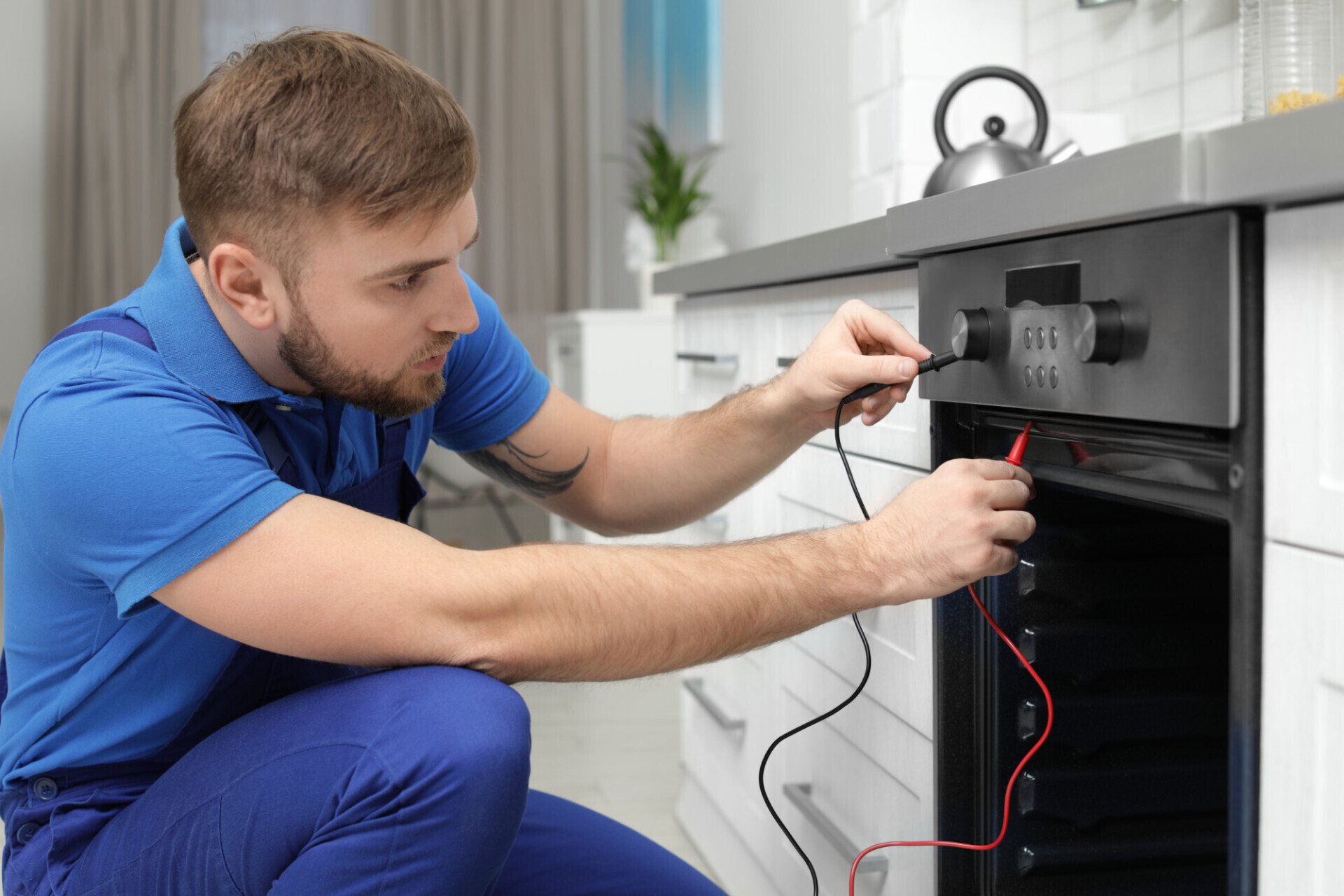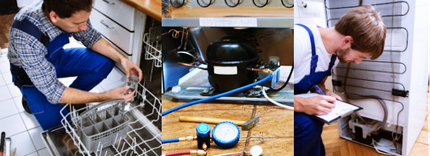The Ultimate Guide to Understanding Home Appliance Fixing at Home
When your fridge quits cooling down or your oven declines to warmth, it can really feel frustrating. Recognizing device repair work at home can conserve you time and cash. You'll find out to identify signs and symptoms, make use of vital tools, and follow a systematic troubleshooting process. Yet prior to you start, there are vital security preventative measures you require to think about. What are the most usual issues, and exactly how can you fix them? Allow's explore the essentials.
Usual Appliance Troubles and Their Signs
When your home appliances start breaking down, it's important to recognize the indicators early. Neglecting them can cause bigger problems and costly repair work. If your fridge isn't cooling down effectively, you might notice cozy places or condensation developing. This might show a falling short compressor or an obstructed vent.Your dishwasher might show problems through unclean dishes or unusual sounds throughout cycles. If you listen to grinding or clanking, it's time to investigate.A washing machine that will not spin or drain can leave you with soaked washing, suggesting a blocked drainpipe or a malfunctioning pump.Lastly, if your oven's temperature level seems off or it takes permanently to pre-heat, you could be handling a damaged thermostat. By staying sharp to these signs and symptoms, you can resolve issues before they rise into significant repair services.
Crucial Devices for Device Repair Service
When you're taking on appliance repairs in your home, having the right tools is essential. Standard hand devices like screwdrivers and pliers will certainly assist you disassemble and deal with different appliances, while electrical screening gadgets guarantee you're working safely with wiring. Let's discuss what you require to begin on your fixing journey.
Standard Hand Devices
Having the right tools is crucial for effective home appliance repair service in your home. Begin with a trusted screwdriver set, consisting of both flathead and Phillips kinds, as screws prevail in device setting up. Pliers are also essential; they aid with gripping, turning, and cutting cords or small components. A set of needle-nose pliers can get to tight places quickly. You'll require an excellent flexible wrench for tightening up or loosening nuts and screws. An utility knife is useful for puncturing product packaging or insulation. Do not fail to remember a sturdy workbench or surface to securely arrange your devices and parts. With these standard hand tools, you'll be well-prepared to take on most appliance repair work that come your means.
Electrical Screening Tools
Alongside fundamental hand devices, electrical testing tools play an important duty in home appliance repair service. These devices assist you detect electric issues and guarantee appliances operate securely. A multimeter is vital; it gauges voltage, existing, and resistance, allowing you to determine troubles swiftly. A non-contact voltage tester is another essential, allowing you identify online wires without making direct contact, improving your safety and security. Clamp meters are wonderful for gauging current circulation in wires without disconnecting them, saving you effort and time. In addition, circuit testers can quickly check if outlets are operating effectively. By utilizing these gadgets, you'll improve your troubleshooting process and improve your repair work abilities, making home appliance maintenance a great deal simpler.
Step-by-Step Overview to Diagnosing Home Appliance Issues
When your device acts up, it can be aggravating, but identifying the problem doesn't need to be overwhelming. You'll learn to identify typical issues and apply reliable repairing techniques. Let's stroll with the actions to get your appliance back in functioning order.
Common Appliance Issues

Fixing Methods Described

Repairing Major Kitchen Area Appliances: A Closer Look
Have you ever before questioned exactly how to deal with common issues with your kitchen area appliances? Fixing significant kitchen appliances like refrigerators, ovens, and dishwashers can be simpler than you assume. Start by identifying the issue-- whether it's a fridge not cooling or a stove that will not warm. Frequently, a straightforward reset or checking the power resource can address the issue.For fridges, tidy the condenser coils and examine the door seals. If your oven's not home heating, inspect the burner and thermostat. Dishwashers may just require a clean filter or a reset to get them back at work. Constantly unplug the device prior to diving into repair work to assure your safety.Don' t neglect to speak with the customer guidebook for specific troubleshooting suggestions associated to your model. With a little persistence and the right tools, you can confidently deal with appliance fixings and conserve cash while doing so!

Repairing Washing Equipments: Tips and Techniques
When your laundry home appliances begin breaking down, it can feel frustrating, however troubleshooting them doesn't have to be a problem. Begin by checking the power supply. Verify the home appliance is connected in and the outlet is operating. Next off, examine the door or cover button; a damaged button can protect against the maker from operating.For washing machines, if it's not spinning, inspect for out of balance loads. Rearranging the clothing could resolve the issue. If your clothes dryer isn't heating, tidy the dust filter and inspect the vent for blockages.Listen for unusual noises; they can suggest a problem. If your device is dripping, examine the hose pipes for fractures or loosened connections. Document any type of error codes shown on electronic screens, as they can lead you in identifying the issue. Speak with the individual guidebook for specific troubleshooting pointers associated to your version.
Safety Precautions to Take During Repair works
Before you start any type of appliance repair services, it's essential to focus on safety to stop accidents or injuries. Unplug the appliance or transform off the circuit breaker to ensure no power reaches it while you function. Use shielded tools to reduce the danger of electric shock. Wear safety goggles and gloves to shield on your own from sharp sides or debris (Dependable Refrigeration & Appliance Repair Service Dryer repair near me).Make particular your workspace is clean and well-lit, so you can see what you're doing. Keep kids and family pets far from the area to prevent interruptions and possible hazards. If you're managing gas appliances, be additional cautious; check for leakages prior to proceeding.Take your time, and don't hurry through fixings. If you feel uncertain about any action, it's better to stop briefly and study than to presume. Following these preventative measures will help develop a much safer setting for your DIY appliance repair task
When to Call an Expert for Aid
How do you recognize if it's time to call a professional for device repairs? If you have actually attempted fundamental troubleshooting without success, it's a clear indicator. As an example, if your appliance still won't start or shows unusual noises after resetting it, don't wait to look for specialist help.When you observe leaks, smoke, or shedding scents, prioritize safety and security and call a pro quickly. These issues can bring about even more substantial damages or position risks to your home.Also, if your device is under warranty, calling an expert is often the finest course. They can assure that fixings will not nullify your warranty, saving you cash in the lengthy run.Finally, if you're not sure or unpleasant with complicated fixings, it's smart to leave it to the specialists. Remember, dealing with difficult problems without the ideal competence can result in costly blunders. Trust an expert when doubtful!
Regularly Asked Concerns
Just How Can I Prevent Device Issues in the Future?
To stop device troubles in the future, you ought to execute regular upkeep, check for wear and tear, tidy filters, and prevent overloading. Staying aggressive will assist expand their life-span and maintain them running efficiently.
What Are the Most Typical DIY Device Repair Service Mistakes?
You might forget safety and security precautions, skip fixing steps, or use incorrect devices when trying DIY home appliance fixings. Rushing the procedure or ignoring maker guidelines can bring about even more considerable problems and pricey blunders. Stay individual and notified!
Just how Do I Know if a Component Needs Replacement?
You can tell if a part requires replacement by looking for unusual sounds, leaks, or inconsistent efficiency. If the device struggles to operate appropriately or shows visible damage, it's likely time for a replacement.
Can I Use Generic Parts for Appliance Services?
Yes, you can make use of common components for appliance repairs, yet identify they work - Dependable Refrigeration & Appliance Repair Service Washer repair near me. Common parts may save you cash, however they might impact efficiency or durability, so weigh your choices thoroughly before making a choice
What Warranties Cover Device Fixes?
Most device warranties cover fixings for manufacturing defects, but they typically exclude damage from misuse. Examine your warranty terms thoroughly, as some might need utilizing certified technicians and original parts for protection to continue to be legitimate.